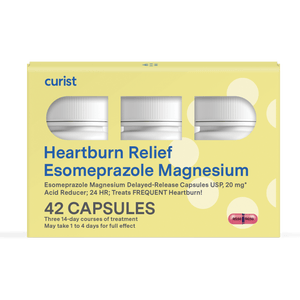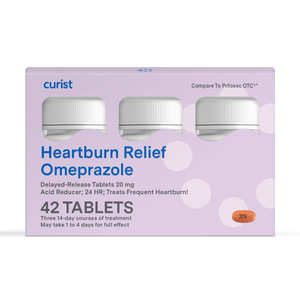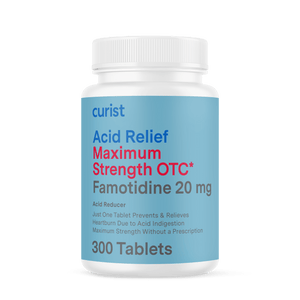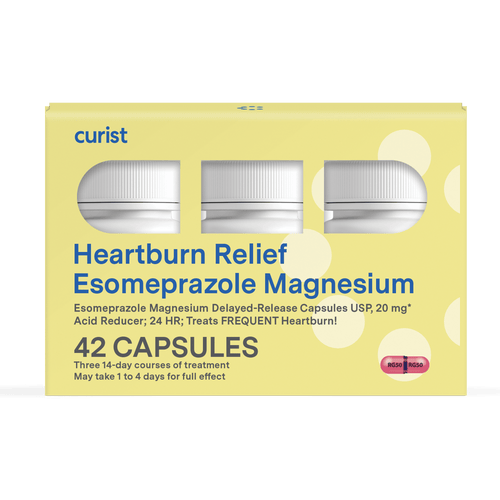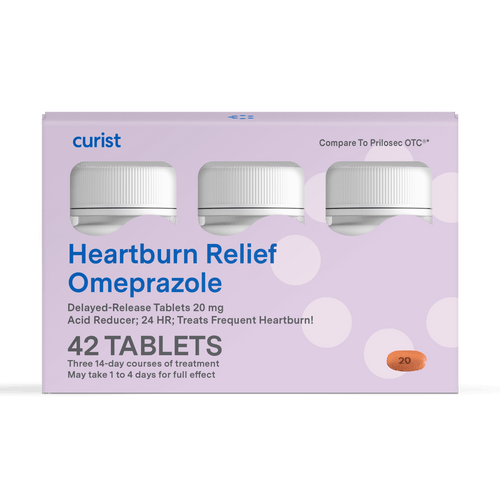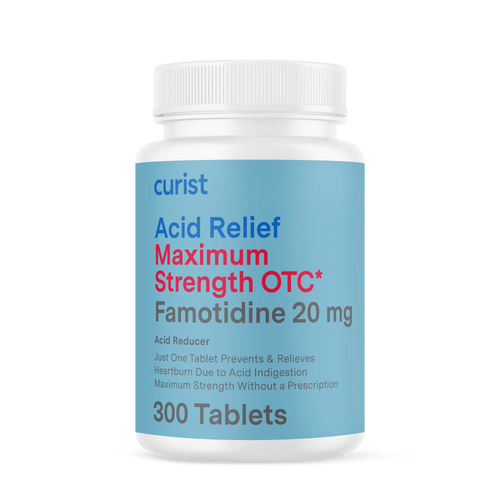by Dr. Waverly Yang, Pharm D, Curist Pharmacy Advisor
Curist delivers over-the-counter medicines to your door at a fraction of the price of traditional brands. We hope everyone stays safe and healthy during this time.
You may have seen both Nexium (esomeprazole) and Prilosec (omeprazole) in the acid reflux relief aisle of your local pharmacy, but what’s the difference between the two?
What Are Proton Pump Inhibitors and Why Do PPIs Work For Heartburn?
Nexium and Prilosec are both proton pump inhibitors (PPIs) and are mainly used to treat frequent heartburn and ulcers. They work by reducing acid production in the stomach to relieve heartburn and allow your stomach and esophagus to heal. Normally, our stomach produces acid during digestion to help with the breakdown of food, but too much acid can cause unwanted symptoms like a burning pain in the chest, stomach pain, or a sour taste in the mouth or throat.
What’s the Difference Between Nexium vs Prilosec?
While Nexium and Prilosec both treat frequent heartburn, they do have a few key differences. Nexium and Prilosec primarily differ based on their chemical structure. Both drugs have different isomers (chemical compounds made of the same atoms but arranged in different ways) that result in slightly different outcomes with how the medications work. The isomer in Nexium is broken down and metabolized more slowly in your body than Prilosec is. This results in Nexium having a longer effect in your body and may even treat symptoms more quickly.
Since Nexium is also metabolized differently in the liver than Prilosec, it may have less potential drug interactions than Prilosec. However, it’s also worth noting that Nexium also tends to be more expensive than Prilosec.
Prilosec vs Nexium: Usage
Both Prilosec and Nexium are best taken for frequent episodes of heartburn as they often take longer to see an effect. To get the most benefit from PPIs, it’s best to take them once daily for 14 days. If you feel you need to use the PPI for more than 14 days, make sure to consult with your doctor first since long-term use of PPIs can result in rebound acid reflux.
Prilosec vs Nexium: Side Effects
Most people do not get side effects from taking Nexium or Prilosec, but it’s possible to experience:
- Diarrhea
- Headache
- Nausea and vomiting
- Stomach pain
- Constipation
If you experience severe symptoms, stop taking the medication and let your doctor know as soon as possible.
Is Nexium or Prilosec Better?
Scientists and clinicians generally agree that both Nexium and Prilosec have the same effects overall, and the American College of Gastroenterology reports that there are no major differences between the two in regards to how they treat heartburn.
While one study did find that Nexium offered faster heartburn relief than Prilosec after one week of use, at the second week, both treatment groups were reported to have similar symptom relief.
While both medications generally offer the same level of relief, it may just come down to personal preference and cost. If you take other medications or have any medical conditions, it’s a good idea to talk to your doctor or pharmacist for advice on the best and safest choice of PPI for you.
To learn more about heartburn and various relief options, check out Curist’s other articles about heartburn:
- Tips to Prevent Acid Reflux & Heartburn
- Food & Diet Tips to Reduce Heartburn
- Omeprazole FAQ
- Esomeprazole FAQ
Where Can I Buy Nexium and Prilosec Online?
The over-the-counter versions of Nexium and Prilosec are available in local pharmacies as well as stores online, and do not need a prescription.
At Curist, we develop FDA-approved equivalents to big brands in order to provide the same medicine relief but at half the price of the brands. Curist products are sold online and shipped directly to your door. To learn more:




